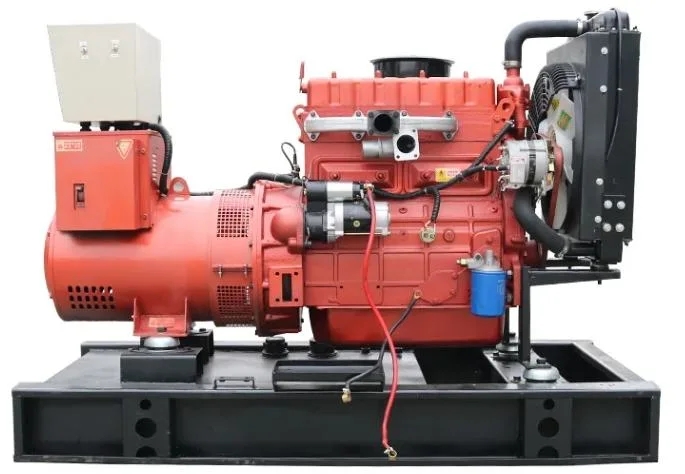Introduction
In recent years, the global focus on transitioning towards renewable energy sources has been steadily increasing due to growing concerns about climate change and energy security. Renewable energy technologies such as solar, wind, and hydropower have made significant advancements and are now being widely adopted to reduce greenhouse gas emissions and dependence on fossil fuels. However, these sources of renewable energy are intermittent and can be affected by factors such as weather conditions and time of day, leading to challenges in maintaining a stable and reliable power supply. As a result, there is a need for complementary technologies to integrate renewable energy into the existing power grid effectively.
Diesel generators have long been used as a reliable source of backup power in remote areas or during emergencies. While diesel generators are not considered a clean source of energy due to their carbon emissions, they can play a crucial role in supporting renewable energy integration by providing backup power during periods of low renewable energy generation or grid instability. This article aims to explore the role of diesel generators in integrating renewable energy systems, the challenges and opportunities associated with this integration, and the potential strategies for optimizing the use of diesel generators in a renewable energy context.
Role of Diesel Generators in Renewable Energy Integration
Diesel generators can serve as a reliable backup power source to ensure grid stability and reliability when renewable energy sources are unable to meet the demand. In off-grid or remote areas where access to the main power grid is limited, diesel generators can provide a viable solution to meet the energy needs of communities or facilities. Additionally, in grid-connected systems, diesel generators can be used as a backup power source to supplement renewable energy generation during periods of low output, such as at night or when weather conditions are unfavorable.
One of the key advantages of diesel generators is their ability to provide power on demand, making them well-suited for balancing fluctuations in renewable energy generation. By integrating diesel generators into renewable energy systems, operators can ensure a consistent power supply and reduce the risk of blackouts or grid instability. Diesel generators can also be used to provide ancillary services such as frequency regulation and voltage support, further enhancing the reliability and resilience of the power system.
Challenges and Opportunities
While diesel generators can play a crucial role in supporting renewable energy integration, there are several challenges and opportunities that need to be considered. One of the main challenges is the environmental impact of diesel generators, as they emit greenhouse gases and air pollutants that contribute to climate change and air pollution. To mitigate these impacts, it is essential to implement emission control technologies and fuel efficiency measures to reduce the carbon footprint of diesel generators.
Another challenge is the cost associated with diesel fuel, which can be volatile and subject to price fluctuations. To address this issue, operators can explore alternative fuel options such as biodiesel or renewable diesel, which offer lower emissions and can help reduce the reliance on fossil fuels. Additionally, incorporating energy storage technologies such as batteries or flywheels can help optimize the use of diesel generators by storing excess renewable energy for later use and reducing the need for continuous diesel operation.
Despite these challenges, there are also opportunities for enhancing the integration of diesel generators with renewable energy systems. For example, advancements in smart grid technologies and control systems can enable operators to optimize the operation of diesel generators based on real-time data and demand forecasts. This can help improve the efficiency and reliability of the power system while minimizing the environmental impact of diesel generators.
Furthermore, the concept of hybrid energy systems, which combine multiple renewable energy sources with diesel generators and energy storage, can provide a cost-effective and sustainable solution for meeting the energy needs of remote or off-grid communities. By leveraging the complementary strengths of different technologies, hybrid energy systems can deliver reliable power supply while reducing carbon emissions and enhancing energy security.
Strategies for Optimizing Diesel Generator Use in Renewable Energy Systems
To maximize the benefits of integrating diesel generators with renewable energy systems, operators can implement several strategies to optimize the use of diesel generators and improve overall system performance. One approach is to implement demand-side management strategies to reduce energy consumption during peak periods and shift the load to times when renewable energy generation is high. 400kw generator can help minimize the reliance on diesel generators and improve the overall efficiency of the power system.
Another strategy is to prioritize the use of renewable energy sources whenever possible and use diesel generators as a backup power source only when necessary. By incorporating forecasting tools and predictive analytics, operators can anticipate fluctuations in renewable energy generation and proactively adjust the operation of diesel generators to maintain grid stability. This can help reduce fuel consumption, emissions, and operating costs while ensuring a reliable power supply.

Furthermore, operators can explore the concept of virtual power plants, which aggregate multiple distributed energy resources including renewable energy sources, diesel generators, and energy storage systems to optimize energy production and consumption. By coordinating the operation of diverse assets through advanced control algorithms, virtual power plants can enhance grid flexibility, improve system resilience, and facilitate the integration of renewable energy at scale.
Conclusion
Diesel generators have a significant role to play in integrating renewable energy systems by providing backup power, grid stability, and ancillary services when renewable energy generation is insufficient. While diesel generators are not considered a clean source of energy, they can be optimized and managed effectively to minimize their environmental impact and enhance the overall performance of the power system. By implementing strategies such as demand-side management, energy storage integration, and virtual power plants, operators can maximize the benefits of integrating diesel generators with renewable energy sources and accelerate the transition towards a more sustainable and resilient energy future.
